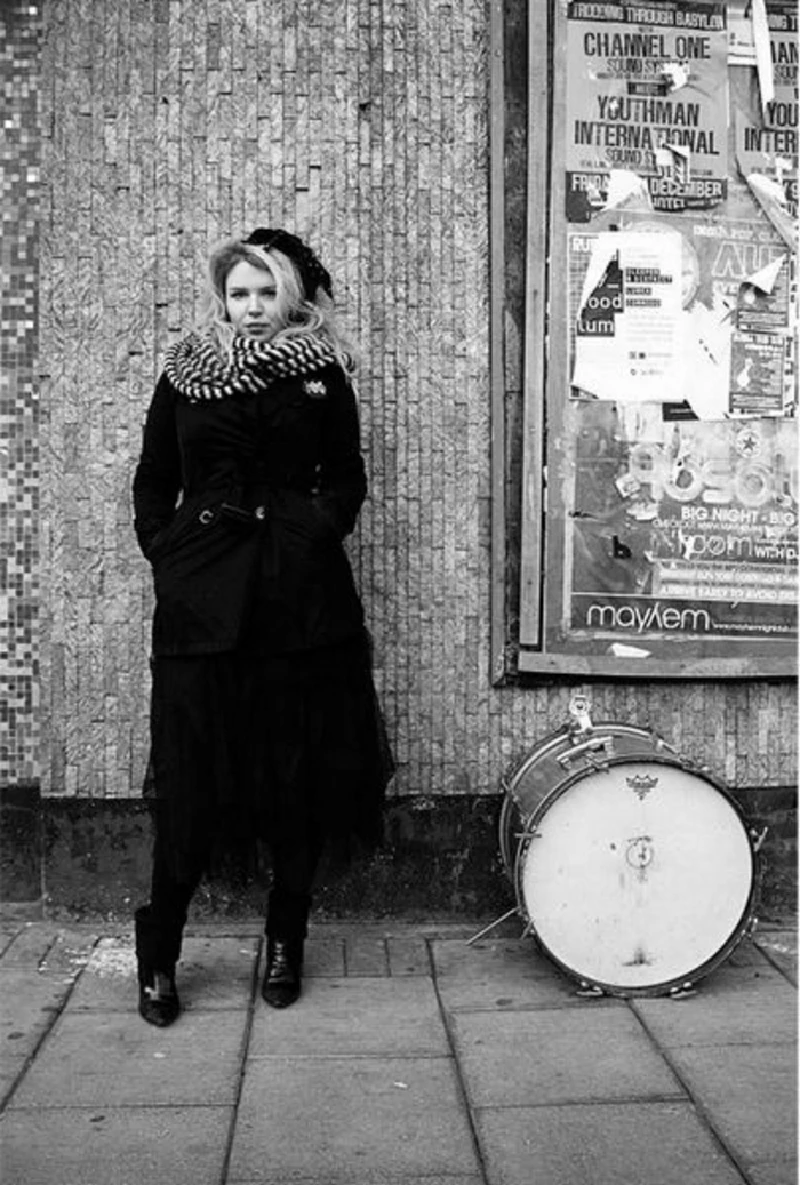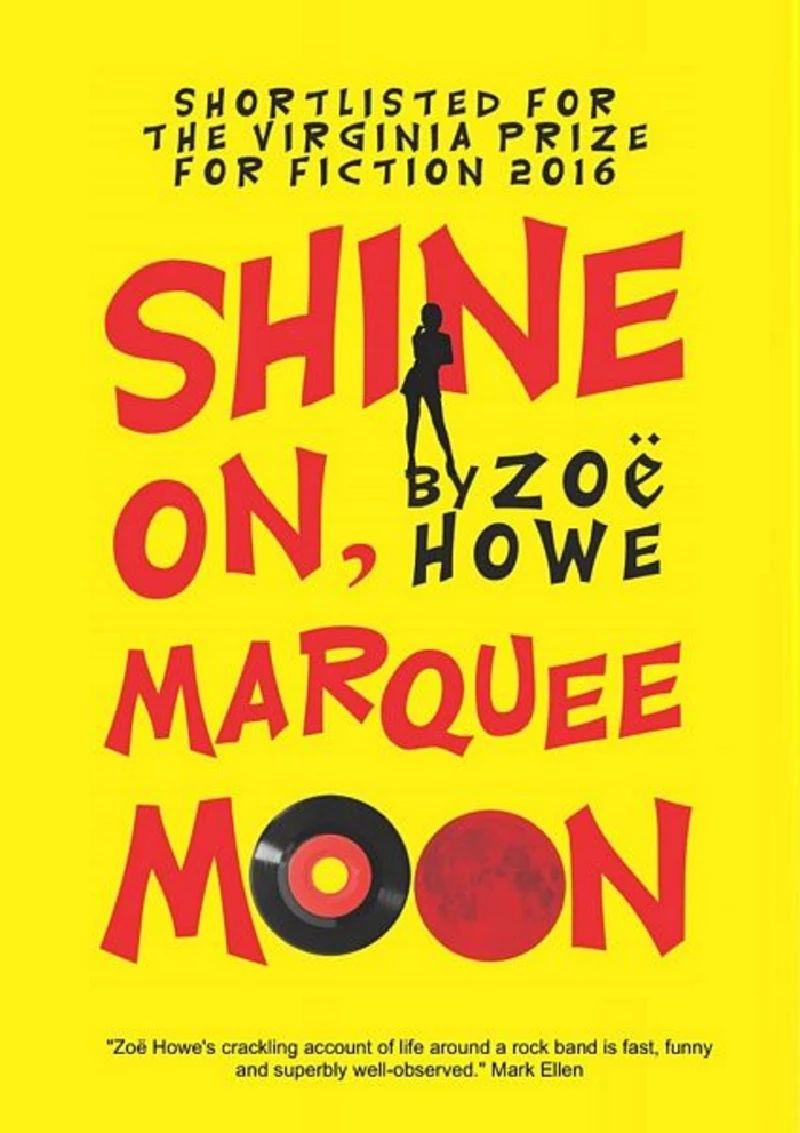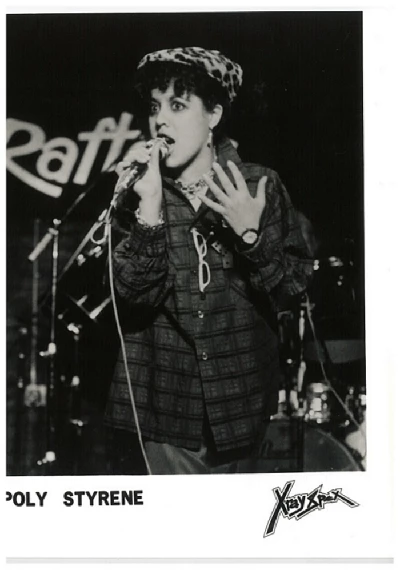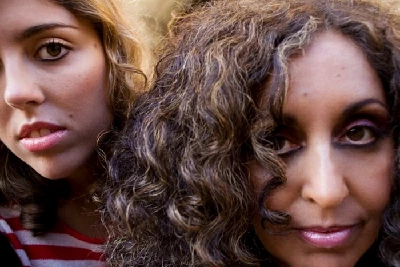Zoe Howe - Interview
by Adrian Janes
published: 30 / 9 / 2016

intro
Music writer Zoe Howe talks to Adrian Janes about her first novel, 'Shine On, Marquee Moon', her biographies of the Slits and the Jesus and Mary Chain, and why self-publishing is punk
Zoë Howe is a well-known music writer and broadcaster, her journalism published in such places as 'The Quietus', 'NME' and 'BBC Music'. She also participates in various music-related events, for example recently hosting a discussion at the British Library of the film ‘Stories from the She Punks’. She is the author of an increasingly impressive range of music biographies. Earlier this year, her ‘Lee Brilleaux - Rock ’n' Roll Gentleman’, a biography of the Dr. Feelgood vocalist, was published. This followed her collaboration with Wilko Johnson, ‘Looking Back at Me’, and a range of other books on bands and singers that includes the Slits, the Jesus and Mary Chain, Stevie Nicks and Florence and the Machine. Combining the passion of the fan with first-hand interviews and writerly skill, her leaning towards the under-appreciated or those who have fallen into neglect does a great service in bringing to the world lesser-known but still significant stories. Having established herself in the field of music biography, her love for music and an informed eye regarding the music business also fuel her first foray into fiction, ‘Shine On, Marquee Moon’, due out in September (http://www.troubador.co.uk/book_info.asp?bookid=4005). Adrian Janes spoke to Zoë about the background to her writing career, her unusual choice of subjects, women in music and the similarities between self-publishing and independent music. PB: Which record, or experience, first sparked your love of music? ZH: Our house was always full of records thanks to my dad being a late night rock DJ at the time. He would be given massive amounts of vinyl and I was in seventh heaven. I was about five when it all started. He was very kind in that he allowed me to play some of his records - I treated them with great respect - and so a passion was born. What this led to was a great love of music that was supposedly before my time - I became obsessed with Led Zeppelin, The Who, the Stones and the Beatles, the Doors - and because obviously I couldn’t see these groups in their prime or otherwise, and this was before the days of YouTube, I literally just had the music. Later I would see film of the The Who and the Beatles, of course, and that sent me into further ecstasies. I remember Dad coming home with a Toy Dolls seven-inch, ‘Nellie The Elephant’, neon green - I can still see it now, I remember turning it over in my hands before sticking it on the old record player I had in my bedroom and wigging out. PB: What was your pathway to being a music writer? ZH: It took me long enough to get there, I did lots of other things before deciding to change path when I was in my mid-20s, but I’m glad I had all of those experiences. My family are essentially theatre folk, that’s what I was brought up into, and that’s what I always thought I would do, but then there came a point when I realised I could live without it - and if you’re going to weather the storms of that life, you have to NOT be able to live without it. I did do lots of stuff I enjoyed and worked with some wonderful people, but I was sick of waiting for work, sick of the whole ‘Please like me’ thing, having to pander to bully directors, wait to speak other people’s words and move in a way someone else wanted me to move and then possibly get ripped off at the end of it. It seemed like a bit of a mug’s game, in the main. It didn’t feel creative, anyway, and it could veer from dull to exploitative to downright damaging. I realise that won’t be everyone’s experience, but in the main, it just wasn’t for me. On the other hand, I did lots of street theatre. That was fun, it felt more creative, I preferred the more gypsy-ish side of acting life, mummers, travelling actors, that’s a great tradition and more wild and thrilling. You get to be autonomous, which I liked, but you have to have a gang of people who are of the same mind-set, which wasn’t easy to find. Anyway, in the meantime, I had rock ’n’ roll, and I’d played drums since I was about eleven, and I’d always loved writing, so I guess I just thought I’d turn my focus to that and see what happened. Things blossomed from that point forth so I knew I hadn’t made a mistake! It started off as me just wanting to do something creative, to come up with my own idea, conjure something out of nothing and see where it went, which I could do with writing. But music always came first, for me. I was a musician before I was a writer. PB: Your books typically explore bands and subjects which haven’t been treated at length, like the Slits, the Jesus and Mary Chain, rock stars and their children. How much does this stem from your own musical taste, and how much from simple curiosity? ZH: It’s fiercer than either of those! It was more "Why the hell hasn’t someone talked to these people at length about the amazing things they’ve done already?" The Slits came first for me, I didn’t know I would ever write a book, I didn’t believe I had the chops (and I was probably correct!) but I was impelled to because I loved their music and their energy. Really - hard as it is to believe now - there was hardly anything out there about them at that time. They’d been sidelined, and I just thought they deserved a book just as much as the Clash did (who have several). So I did it, to coincide with the 30th anniversary of their album 'Cut'. It was the same with the Mary Chain, and I suppose they had a similar spirit. They were outcasts in a way but they’d screwed up their courage and were being creative and inventive and they were changing things, and they were being brave - it wasn’t easy for them, but they were doing it anyway. It’s often the people who come after who nab the credit but, again, it was an opportunity to make sure those stories and experiences were collected and written down. ‘How’s Your Dad?: Living In The Shadow Of A Rock Star Parent' might seem like an anomaly here but really the idea came from the same feeling - so much is lazily assumed about these people, but not that many people bother to actually listen to what they have to say about their own experiences. We just decide what the score is there, with a bit of help from the tabloids. "Oh, they must be like this." And then we move on. Well, that’s not very fair, is it? My husband’s dad is a well known guitarist - I’d never really thought about the ‘rock star kids’ phenomenon before, but when I started to see how many people assumed stuff about my husband that just wasn’t the case, or tried to use him to get to his dad, refused to look at anything he was doing in his own right, I just thought, "Bloody hell, that’s annoying... and interesting!" And so I started to speak to more people in the same position as him for the book - it’s essentially a humour book as much as it is a music book, but there are dark moments. PB: The Slits, Siouxsie and Patti Smith were clearly key female role models in music in the late 1970s. Do you think they continue to be influential for today’s musicians, or are they now neglected or disparaged, as some younger feminists now regard someone like Germaine Greer? ZH: Yes, I think they are probably even more influential, in a way - thanks to all these books and YouTube and the punk anniversaries etc, more people are gaining access to influential artists such as the people you name checked there, and that punk spirit is never irrelevant. Sometimes you get people who were ‘there’ getting irritated by younger people getting into punk, they feel possessive, which is a bit ridiculous - surely it’s a great thing that people are still inspired by punk. It’ll never die as long as new generations take inspiration from it and feel liberated by it. How powerful and positive is that? I have that magic punk spirit to thank for so much, it unlocked me and blitzed a lot of anxiety. OK, I wasn’t "there" when it was born, but that fierce spirit can and will be passed on and I hope it always will be! PB: Until reading ‘How’s Your Dad?’ I didn’t even know Steve Howe had any children. Isn’t it often the case that the fact of musicians as parents is obscured, if not totally ignored? Is this because it’s felt to detract from their image in some way? ZH: Well, Steve is quite private, so you weren’t going to see him with all his kids hanging off him at a festival like Keith Richards or something like that, I suppose. I don’t think he would have felt it detracted from his image though. He’s always been very proud of his kids - there’s a picture of Dylan (my husband) as a child on one of the Yes albums. They didn’t have a problem with people knowing they had families. They weren’t like the Beatles - no one being allowed to know about the wives and children during their peak in case of mass fan freak-outs...I think it depends on the artist. Alice Cooper’s daughter actually appears in his touring show with him,and they’re like a double act! PB: ‘How’s Your Dad?’ is pretty much unique in its examination of the ways in which being the child of a rock or pop star affects the child’s own life and career. Overall, is such a background more of a help than a hindrance? ZH: I think it helps, but maybe less than people imagine! It helps to be exposed to music and everything that goes with it from an early age - you’re less starry-eyed about it, but those ‘contacts’ that are supposedly handed to you on a plate...it doesn’t always work like that. They also risk being exposed to damaging experiences and influences that people from ‘average’ backgrounds never come up against, or at the very least there can be a detrimental lack of boundaries - the kind most teenagers would dream of! The reality can lead to some bad scenes. Many kids of rock stars end up having to act like the parent. A good number of people I spoke to seemed to have missed out on a childhood. There’s also an assumption that the kids of rock stars are all rich and sorted and on some kind of private income. No...Some are, definitely. Some are completely coddled. All I can say is my husband took a job as a window cleaner at the age of sixteen and has always been a grafter and earned his own money. I wanted to write the book for him, essentially, to stop people from making these lazy assumptions that he was some spoilt rich kid brat who’d never done a day’s work in his life! He deserves so much more respect than that, but people rarely bother to look below the surface. PB: You find quite a lot of occasion for humour in your books, even in writing about the famously dour and fractious Jesus and Mary Chain. Is there any contradiction between loving bands and also finding them funny? ZH: I don’t think so. I think as soon as bands start taking themselves too seriously they become deeply unsexy, in my opinion. PB: Would you agree that nowadays there aren’t the vivid characters in music who make for exciting biographies? And if that’s right, why should it be so? There are still plenty of bands around and records getting made, after all. ZH: I’m probably the wrong person to ask - I’m happily embedded in a past which is only partly my own, if you know what I mean! But it’s a different time, different things are ‘allowed’, everything feels a lot more controlled. I think the big characters are more in art and fashion now. PB: Your novel ‘Shine On, Marquee Moon’ is built around two characters’ love of Television’s classic debut album. Why did you choose that album rather than any other? What special qualities do you hear in it? ZH: Just because it’s extremely special to me, I suppose. I think 'Marquee Moon' might have saved my life once, or at least my sanity. (Stop laughing at the back.) It’s transcendently beautiful but also kind of ragged, damaged-sounding. Glorious. I have a bit of synaesthesia when it comes to music and when I listen to 'Marquee Moon' the colours are crazy, very light gold, magic-hour blue, cotton-candy nebula pink... Have you seen the cotton-candy nebula? Look it up. You won’t believe it’s real. PB: You’re self-publishing this book. Are there parallels between this approach and bands releasing albums on their own labels and/or over the internet? ZH: Yes, and all artists making their own way autonomously - I think all creative people should have as much control over their work as possible. People don’t have a problem with visual artists doing that, or musicians, and the stigma around authors putting out their own work independently seems to finally be disappearing too. I’ve worked with an editor, so it’s not going out raw, and it’s got a great cover design but it’s also not been pushed and pulled by someone who ultimately will never care about it as much as I do. Self-publishing is quite punk, it’s DIY! It’s good not to be told what to do, or have your precious ideas co-opted or changed, or to have to write in a scene you think is cringey because someone tells you to. It’s your work, so let it be YOUR WORK. Take advice where necessary, but don’t lose the sense of what you actually wanted to set out to do. This isn’t to say I wouldn’t want to work with publishers in the future, mind - I absolutely love working with the right publisher and the right editor - but this is my first novel and it’s a personal project, so I wanted to put it out myself almost as a kind of experiment. I’ve also learned that the people creatives often put their trust in don’t always know better, despite what they put across. I was told on several occasions by ‘people who know’ that the Lee Brilleaux book would never get off the ground. I did it anyway and it’s done really well. So if you have an idea in your heart, and it’s a good one, don’t pussyfoot around asking for permission to do it. Just DO IT! And if you need to collaborate with someone, don’t just give up if a publisher or agent dismisses you. You just need to find the right fit. If you fancied someone in a bar and they weren’t attracted to you, you wouldn’t then go and shoot yourself in the face. You’d just try and find someone who was a better fit. Or you’d go home and, erm, enjoy your own company. I guess the latter example must represent self-publishing. Oh dear. PB: Beyond the publication of ‘Shine On, Marquee Moon’, do you have any other writing projects in mind yet? ZH: I’m already writing the sequel! I’m enjoying writing fiction, it’s rather nice to be relieved of the responsibility of other people’s stories, much as I loved writing biographies and working directly with artists that way. But I’m loving the chance to be more creative with my writing. It’s fun and very freeing. PB: Thank you. More information about and signed editions of 'Shine On, Marquee Moon' is available at; https://zoehowe.bandcamp.com/merch/shine-on-marquee-moon-paperback
Band Links:-
https://www.zoehowe.com/https://www.facebook.com/ZoeHoweBooksEtc/
https://twitter.com/ladyzoehowl
https://www.polystyrenefilm.com/
Picture Gallery:-

interviews |
|
Interview (2019) |

|
| Music writer Zoë Howe talks to Adrian Janes about ‘Dayglo: the Poly Styrene Story’, which is about the late X-Ray Spex vocalist and songwriter Poly Styrene and which has been written in close collaboration with Poly’s daughter Celeste Bell. |
most viewed articles
current edition
Carl Ewens - David Bowie 1964 to 1982 On Track: Every Album, Every SongArmory Show - Interview with Richard Jobson
Colin Blunstone - Thalia Hall, Chicago, 16/7/2025
Bathers - Photoscapes 1
Visor Fest - Valencia, Spain, 26/9/2025...27/9/2025
John McKay - Interview
Billie Eilish - O2 Arena, London, 10/7/2025
Robert Forster - Interview
Sir Tim Rice - Interview
Loft - Interview
previous editions
Heavenly - P.U.N.K. Girl EPManic Street Preachers - (Gig of a Lifetime) Millennium Stadium, Cardiff, December 1999
Beautiful South - Ten Songs That Made Me Love...
Pixies - Ten Songs That Made Me Love...
Oasis - Oasis, Earl's Court, London, 1995
Paul Clerehugh - Interview
Prolapse - Interview
Trudie Myerscough-Harris - Interview
Doris Brendel - Interview
Peter Perrett - In Dreams Begin Responsibilities Interview Part One
most viewed reviews
current edition
Sick Man of Europe - The Sick Man of EuropePhew, Erika Kobayashi,, Dieter Moebius - Radium Girls
Amy Macdonald - Is This What You've Been Waiting For?
Davey Woodward - Mumbo in the Jumbo
Alice Cooper - The Revenge of Alice Cooper
Lucy Spraggan - Other Sides of the Moon
Blueboy - 2
Cynthia Erivo - I Forgive You
Suzanne Vega - Flying With Angels
Bush - I Beat Loneliness
related articles |
|
Celeste Bell: Interview (2019 |

|
| Celeste Bell, the daughter of late X-Ray Spex singer Poly Styrene , talks to Adrian Janes about her mother and ‘Dayglo: The Poly Styrene Story’, the new music biography which she has written in collaboration with music writer Zoë Howe. |
Pennyblackmusic Regular Contributors
Adrian Janes
Amanda J. Window
Andrew Twambley
Anthony Dhanendran
Benjamin Howarth
Cila Warncke
Daniel Cressey
Darren Aston
Dastardly
Dave Goodwin
Denzil Watson
Dominic B. Simpson
Eoghan Lyng
Fiona Hutchings
Harry Sherriff
Helen Tipping
Jamie Rowland
John Clarkson
Julie Cruickshank
Kimberly Bright
Lisa Torem
Maarten Schiethart